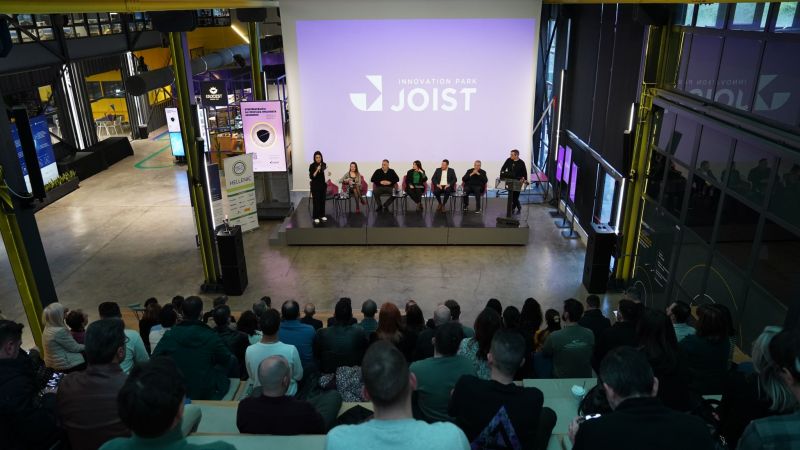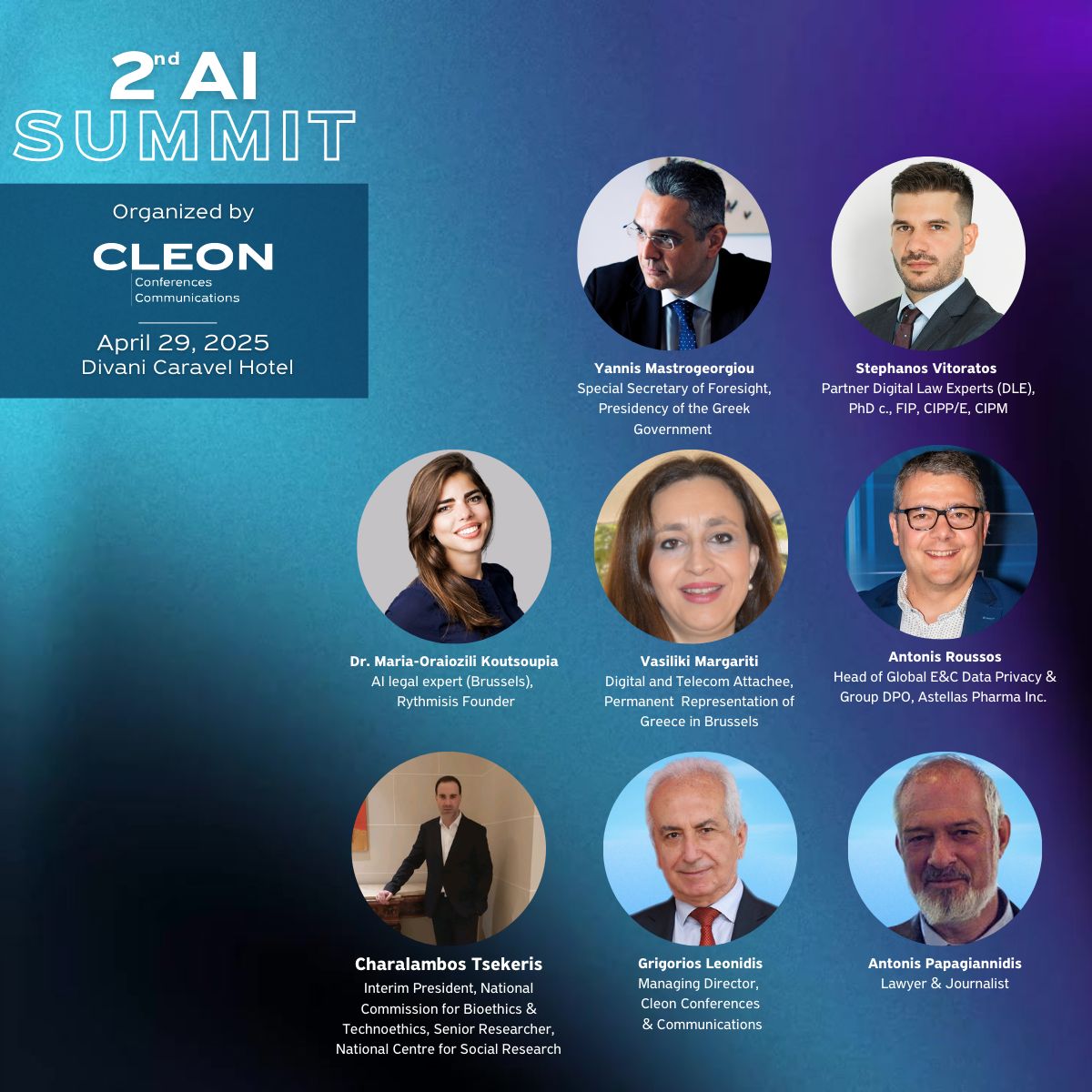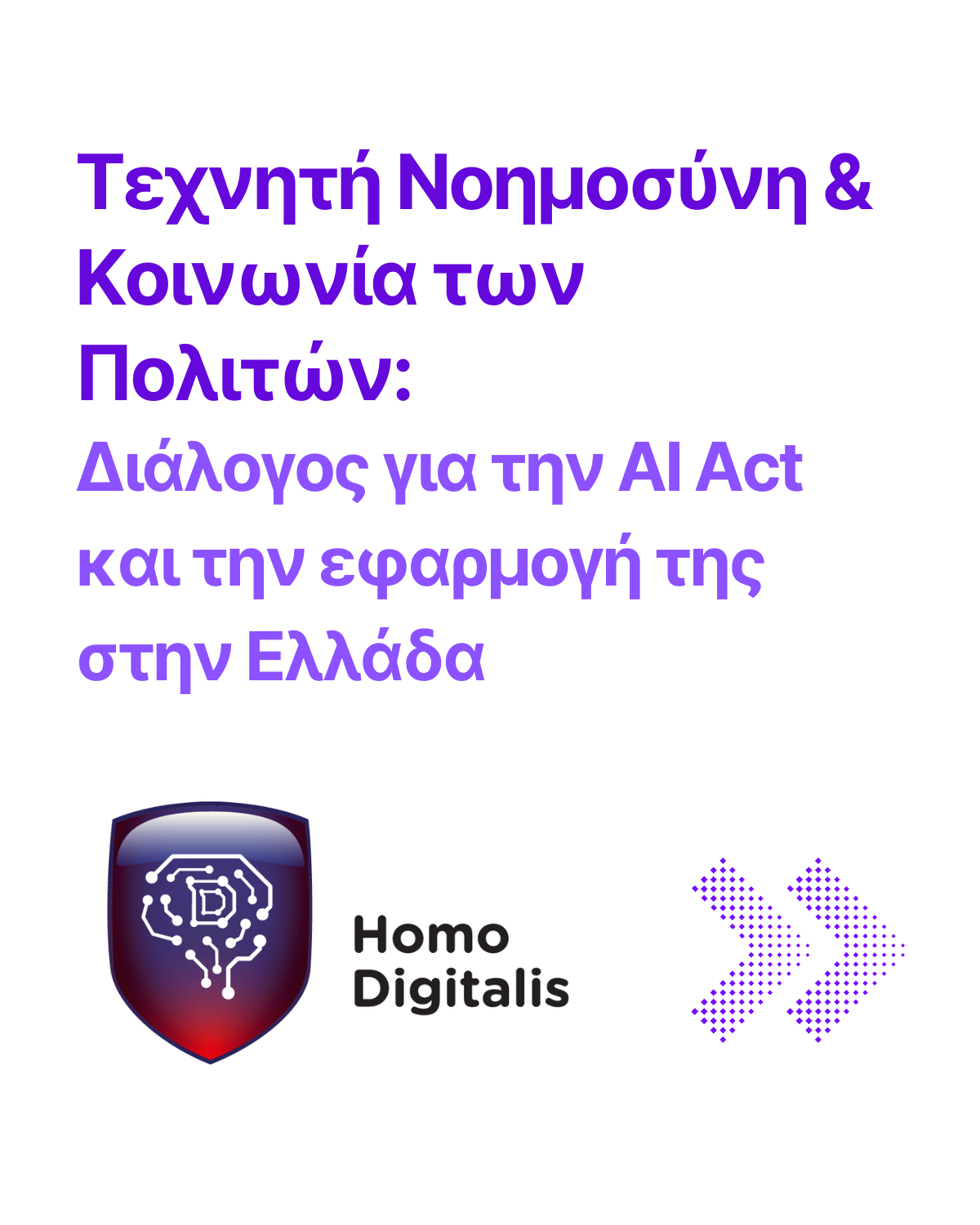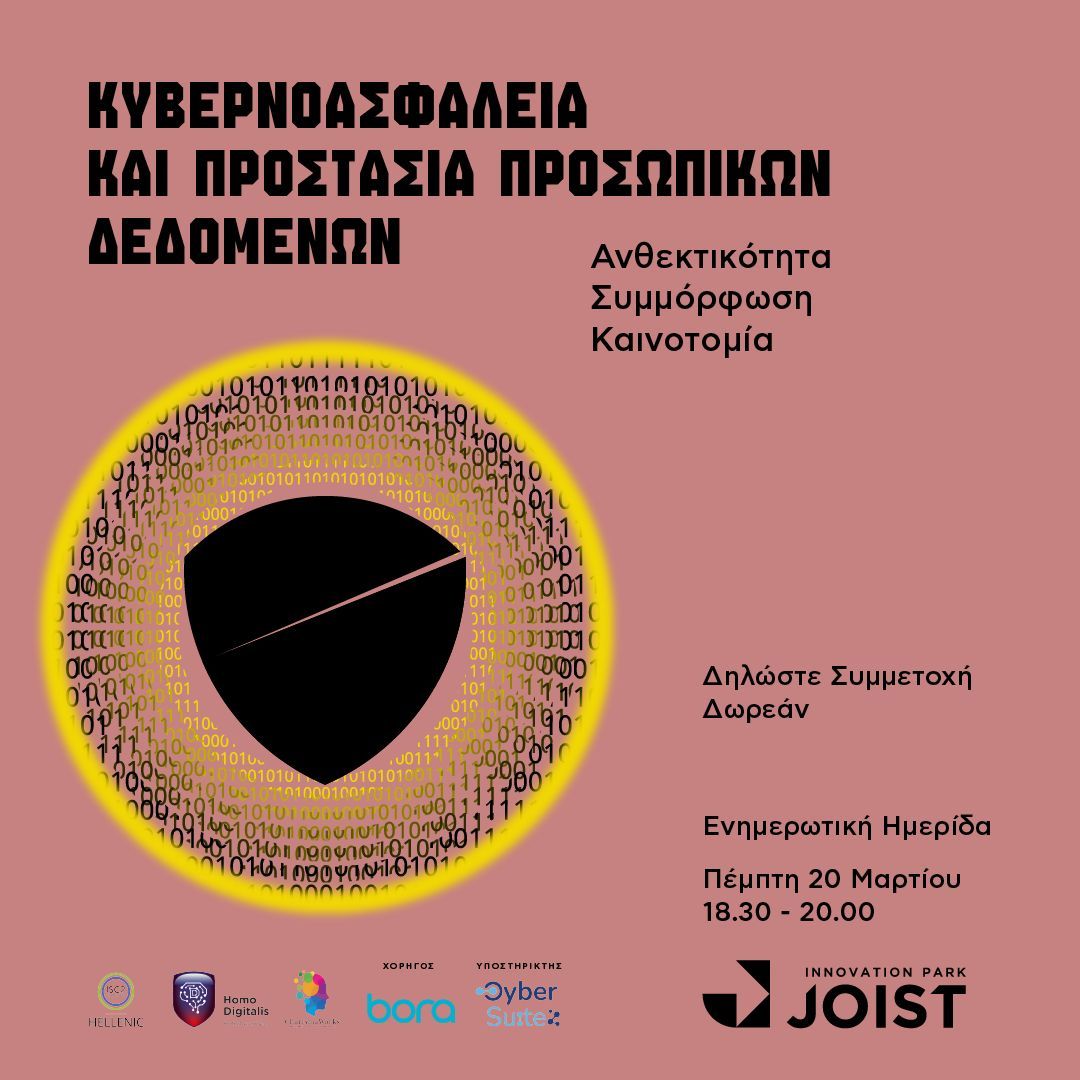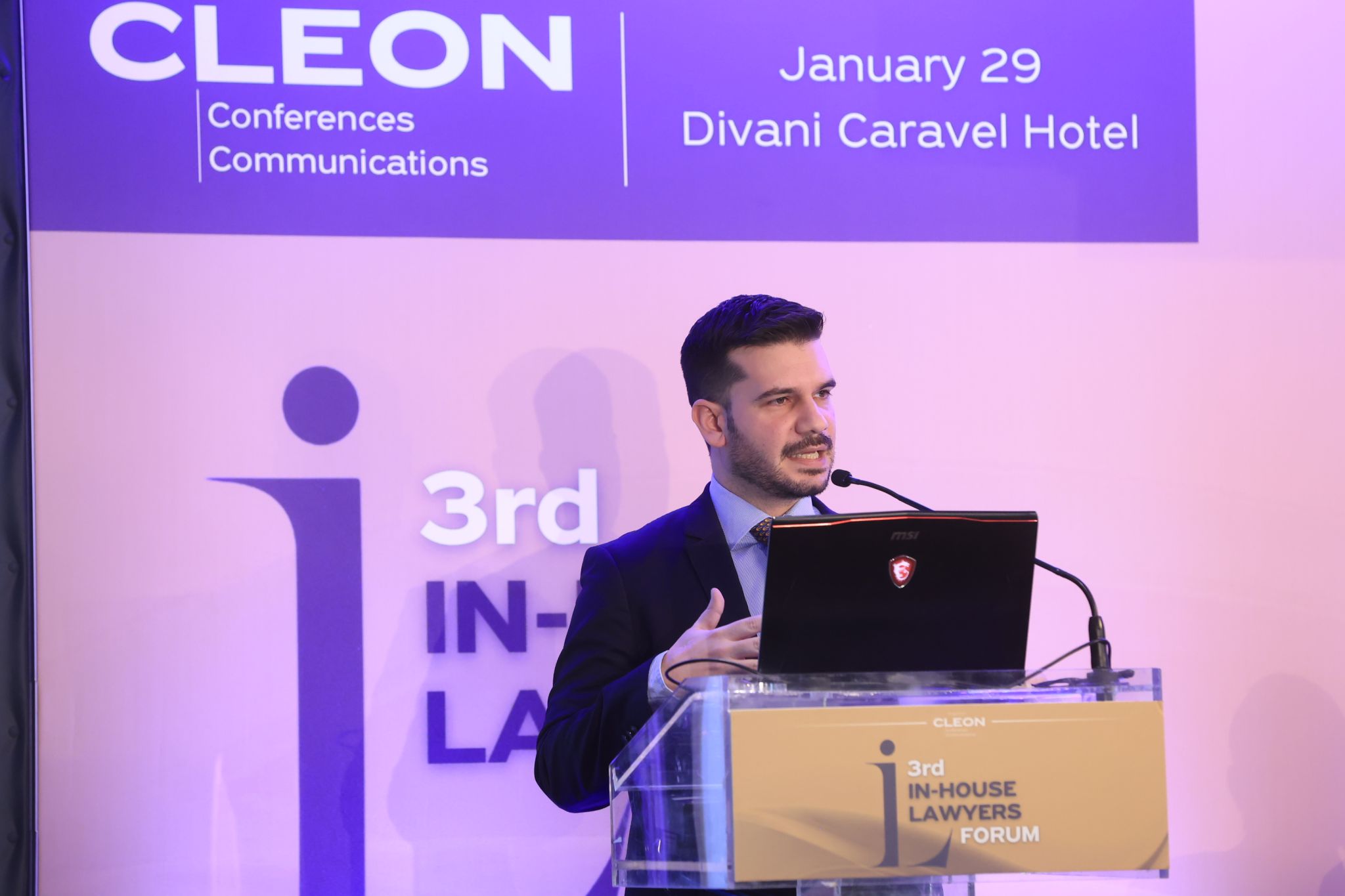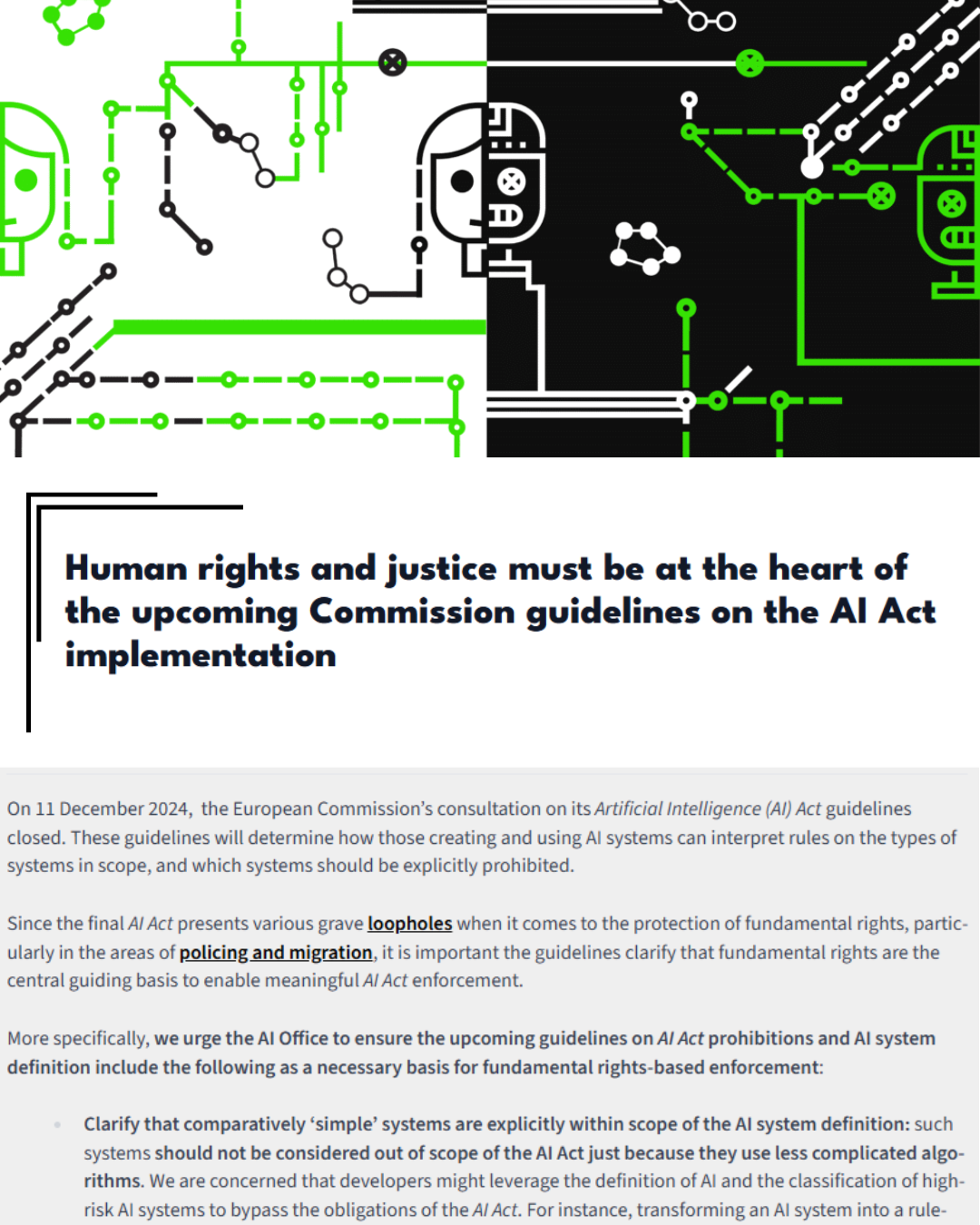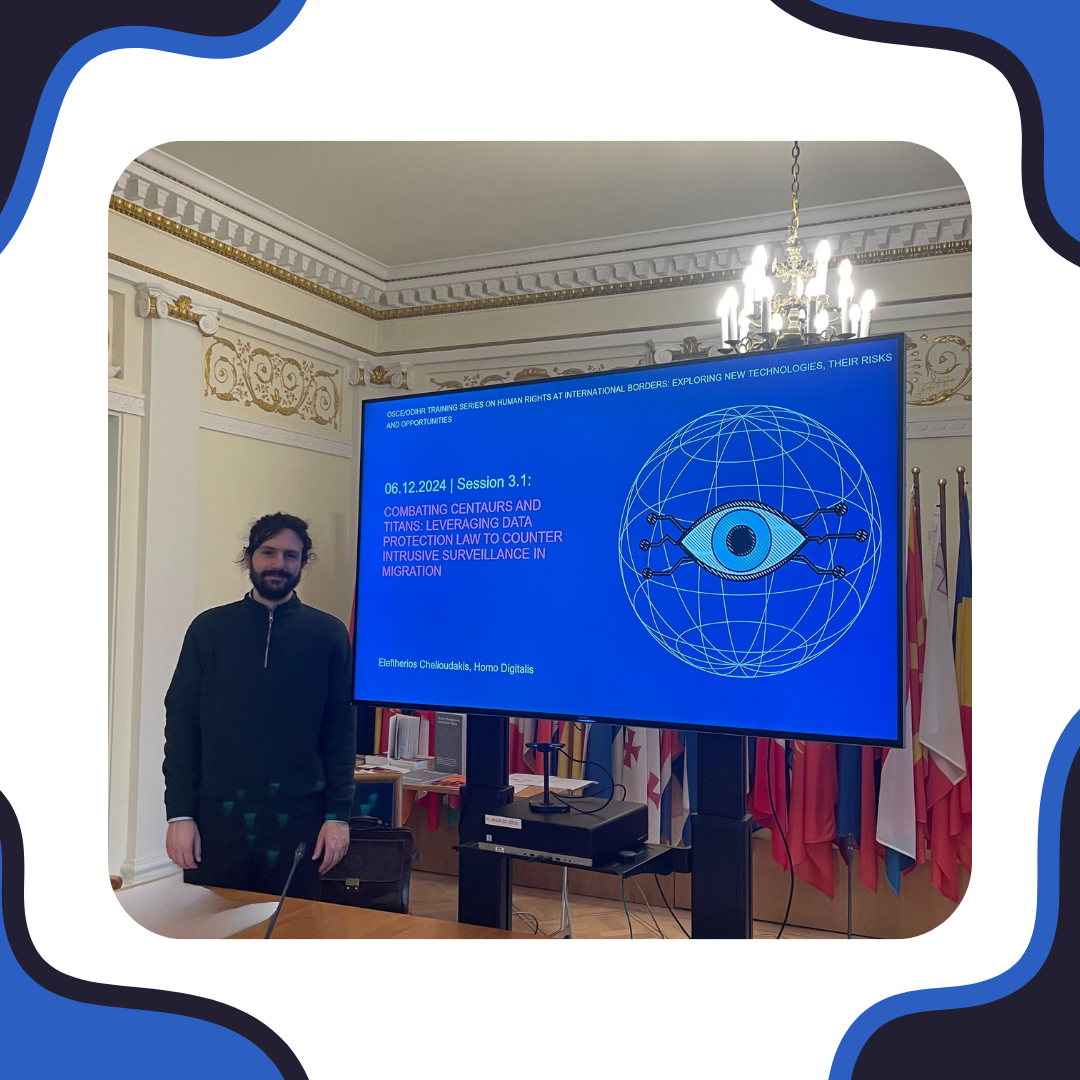Homo Digitalis co-organized and participated in the event "Cybersecurity and Data Protection: Resilience, Compliance, Innovation" at JOIST
Two weeks ago, Homo Digitalis co-organized and participated in the event “Cybersecurity and Data Protection: Resilience, Compliance, Innovation” at JOIST Innovation Park, in Larissa, Greece.
Our Director on Human Rights & AI, Lamprini Gyftokosta represented us there, while our member Anastasios Arampatzis representing Bora – Cybersecurity Marketing moderated the discussion!
With a focus on raising awareness among SMEs and entrepreneurs on data protection and cybersecurity, our panel brought together key experts to explore security, compliance, and innovation, ensuring a privacy preserving digital future.
The list of our esteemed co-panelists included:
-Michail Bletsas Governor, National Cybersecurity Authority
-Panagiotis Soulos – ISC2 Hellenic Chapter, Audit Committee Member, Information Security GRC Senior Manager, STEELMET Corporate Services
-Yiannis Koukoùras – ISC2 Hellenic Chapter Member, Managing Director, TwelveSec
-Karina Iskandarova – Founder, CharismaWorks
A huge thank you to JOIST’s team and the rest of co-organizers, speakers, and participants for this wonderful evening.
Registration for the 2nd AI Summit of Cleon Conferences, under the auspices of Homo Digitalis, is now open
CLEON Conferences & Communications is organizing the 2nd AI SUMMIT under the auspices of the Ministry of Digital Governance, SEKEE, ISACA, Homo Digitalis, and Rythmisis.
The conference will be moderated by lawyer and journalist Antonis Papagiannidis, while a speech will also be given by Stefanos Vitoratos, co-founder of Homo Digitalis and lawyer.
The conference will take place on Tuesday, April 29, at the Divani Caravel Hotel in Athens.
Don’t miss the opportunity to stay informed about the latest developments and trends in AI!
You can register here.
Homo Digitalis Event on the AI Act and opportunities for synergies for Civil Society Organizations
On Thursday, February 27, Homo Digitalis organized the first-ever workshop on the AI Act for Civil Society Organizations in Greece at its offices in ViOS Coworking Space!
More than 20 organizations participated, coming from diverse backgrounds but sharing a common interest: collaborating on the challenges and opportunities arising from the AI Act.
Event Highlights
During the event, we presented our three thematic studies on the AI Act:
-Fundamental Rights Impact Assessments (FRIAs)
-Supervisory Authorities & AI Governance Ecosystem
-Prohibited Practices
We also hosted thematic discussion groups on four key topics:
-Environment & Artificial Intelligence
-Business Practices & Algorithmic Transparency
-AI in Policing & Migration
-AI Systems, Democracy & the Information Society
A Huge Thank You!
We extend our heartfelt thanks to all the organizations that participated, bringing their energy, trust, and spirit of collaboration!
A special thanks to the Homo Digitalis team for organizing the event and presenting our studies: Sofia Antonopoulou, Niki Georgakopoulou, Lamprini Gyftokosta, Tania Skrapaliori, Eleftherios Chelioudakis, and Stavroula Chousou.
Proudly Supported by:
This event was made possible with funding from the European AI & Society Fund and European Digital Rights—we are incredibly proud of their support!
Join Us!
Want to be part of this collaborative effort? Fill out the contact form on our website!
Participating Organizations:
ActionAid Hellas, KEAN – Cell of Alternative Youth Activities, Greenpeace Greece, WWF Greece, inside story., Reporters United, Solomon, Eteron Institute, KnowledgeRights21, EKPIZO, Greek Council for Refugees, Open Lab Athens, Vouliwatch, Amnesty International – Greece, Transparency International Greece, I Have Rights., HIAS Greece, Open Technologies Organization, CopWatchGR, Hellenic League for Human Rights, omniatv, Diversity Charter Greece, Generation 2.0 for Rights, Equality and Diversity.
We are co-organizing an event on Cybersecurity and Personal Data Protection at the JOIST Innovation Park in Larissa!
On March 20, 2025, from 18:00 to 20:30, Homo Digitalis is delighted to co-organize and participate in the event “Cybersecurity and Personal Data Protection: Resilience, Compliance, Innovation” at the JOIST Innovation Park in Larissa!
The event aims to raise awareness and empower businesses of all industries and sizes so they can become resilient and innovate safely while respecting citizens’ rights.
Speakers at the event include:
Michail Bletsas, Head of the National Cybersecurity Authority
Panagiotis Soulos, Member of ISC2 Hellenic Chapter, Information Security GRC Senior Manager at STEELMET Corporate Services
Lamprini Gyftokosta, Director of Human Rights & Artificial Intelligence at Homo Digitalis
Giannis Koukouras, Member of ISC2 Hellenic Chapter, Managing Director at TwelveSec
Karina Iskandarova, Founder of CharismaWorks
The event will be moderated by Anastassios Arabatzis from Bora – Cybersecurity Marketing and Homo Digitalis.
Register for free here.
We are granting our patronage to the 3RD IN-HOUSE LAWYERS FORUM
Once again, Homo Digitalis has the great honor and pleasure of granting its patronage to the 3RD IN-HOUSE LAWYERS FORUM, organized by CLEON Conferences & Communications on January 29th at the Divani Caravel Hotel in Athens!
Among the speakers, we were proud to have some of our members, in their professional capacity, including our Board Secretary, Stefanos Vitoratos!
We thank the organizers for the collaboration, including Mr. Grigorios Leontidis. You can learn more about the conference here.
Our organization voluntarily grants its patronage to selected actions, initiatives, and other events, aiming to actively support and promote initiatives related to the protection of digital rights. If you have relevant goals and are interested in a pro bono collaboration, please contact us at info@homodigitalis.gr.
Homo Digitalis spoke at the World Economic Forum in Davos, Geneva.
Doing More With Less at Geneva Day in Davos: How to address growing needs in times of economic uncertainty?
We explored this crucial question on Monday 21/1 during a panel discussion held as part of Geneva Day at the House of Switzerland in Davos. We were proud to participate in this event co-organised by Swiss Financial Innovation Desk and the Permanent Mission of Switzerland to the United Nations in Geneva, during the World Economic Forum 2025.
This engaging discussion explored emerging technologies such as Artificial Intelligence (AI), Blockchain, and Central Bank Digital Currencies (CBDCs), combined with innovative fiscal policies, as tools to meet the critical challenges of tomorrow. Our president, Elpida Vamvaka, represented our team speaking about our important actions and victories in the field of AI in Greece, as well as the NGI – The Next Generation Internet NGI TALER project, building a new, privacy-preserving, secure electronic payment system based on open standards, free software, and advanced cryptography.
A heartfelt thank you to the organisers and the distinguished panelists Christoph König, Deputy State Secretary, State Secretariat for International Finance SIF, Kelly T. Clements,, Deputy High Commissioner at UNHCR, the UN Refugee Agency, Daniel Eidan, Advisor & Solution Architect at Bank for International Settlements – BIS Innovation Hub.
The amazing Eva Selamlar-Leuthold, Head of Swiss Financial Innovation Desk (FIND), moderated this particularly dynamic and insightful discussion in a unique manner.
We would also like to extend our warmest thanks to Jonas Pasquier, Head of Global Affairs at the Permanent Mission of Switzerland to the UN in Geneva, his entire team, the Mission, as well as the Presence Switzerland team at the House of Switzerland, for making this event a success.
Would you like to get more insights from this discussion. Stay tuned for an upcoming publication by the Swiss Financial Innovation Desk, here.
The President of Homo Digitalis, Elpida Vamvaka, is Invited to WEF at DAVOS: Recognition on a Global Stage
We are thrilled to announce that Homo Digitalis has been invited to participate in an esteemed panel discussion at DAVOS, organized by the Swiss Financial Innovation Desk (FIND) of the State Secretariat for International Finance and the Permanent Mission of Switzerland to the UN in Geneva in the context of the World Economic Forum (WEF).
Event Details:
Topic: Doing More with Less: How to Address Growing Needs in Times of Economic Uncertainty
Date & Time: Tuesday, January 21, 2025 | 17:00-18:30
Location: Crystal Lounge, Davos
Our President, Elpida Vamvaka, will join a distinguished panel of global leaders to discuss how emerging technologies such as Artificial Intelligence (AI), Blockchain, and Central Bank Digital Currencies (CBDCs) can empower governments and organizations to address critical global challenges in times of economic uncertainty. Specifically, in the panel hosting our President, Elpida Vamvaka will be also speaking:
– Christoph König, Deputy State Secretary, State Secretariat for International Finance
– Kelly Clements, United Nations Deputy High Commissioner for Refugees
– Morten Bech, Centre Head Switzerland, Bank for International Settlements (BIS) Innovation Hub
The moderator of the panel will be Eva Selamlar, Head of Swiss Financial Innovation Desk (FIND)
While we celebrate this global recognition, it underscores the need for similar trust and acknowledgment at the national level in Greece. Strengthening Greece’s commitment to technological innovation and policy foresight will pave the way for meaningful change.
You can find more details about the event here.
Let’s make human rights-oriented innovation the cornerstone of a brighter and more resilient future – for Greece and the world.
Joint Statement on the Upcoming European Commission Guidelines on Prohibited Practices of the AI Act
We are publishing a joint statement on the upcoming European Commission Guidelines on Prohibited Practices of the AI Act.
On December 11, 2024, the European Commission completed its public consultation on the interpretation of the definition of an AI system and on prohibited AI practices, in accordance with the provisions of Regulation 2024/1689 (AI Act). Homo Digitalis participated in the related process.
In the context of the issuance of the expected guidelines by the Commission, concerns remain about potential gaps that could jeopardize fundamental rights. For this reason, and together with more than 25 civil society organizations, academics, and other experts, we are issuing a statement today, urging the AI Office and the European Commission to ensure specific demands.
You can read our joint statement here.
Eleftherios Chelioudakis of Homo Digitalis as a Trainer in the 3rd OSCE ODIHR Training on Personal Data & Border Management
From December 4 to 6, Eleftherios Chelioudakis, our Co-founder and Executive Director, participated as a trainer in the third training session organized by the international organization OSCE, specifically its Office for Democratic Institutions and Human Rights (ODIHR) in Warsaw. The training explored the use of new technologies at international borders, as well as the risks and opportunities they pose for Human Rights.
In our five presentations, we focused on the technologies used at borders, the Human Rights impacted by these uses, the provisions of the GDPR and Directive 2016/680 LED, the significant decision by the Hellenic Data Protection Authority (HDPA) regarding the “KENTAYROS” and “YPERION” systems, as well as technical tools that human rights defenders can use in their work!
We extend our heartfelt thanks to the participants for their dynamic presence, to the team of outstanding trainers Nikola Kovačević, Djordje Alempijevic, and Arancha Garcia del Soto for their knowledge and expertise, and to the organizing team, Lola Girard and Veronica Grazzi, for their impeccable organization and contributions. It is a great honor for us to participate!
You can learn more here.
